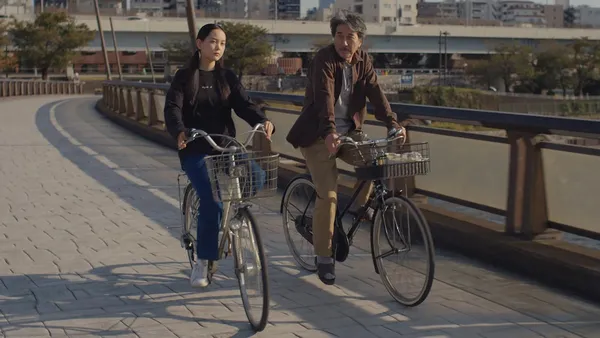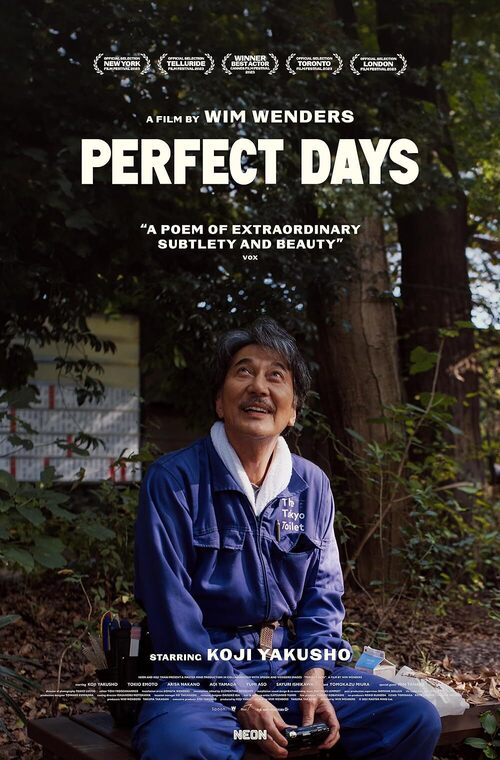Eye For Film >> Movies >> Perfect Days (2023) Film Review
Perfect Days
Reviewed by: Anne-Katrin Titze

Once upon a time, many many moons ago during a lunar eclipse (as the reception of his 2003 Pictures From The Surface Of The Earth photograph exhibition at the James Cohan gallery in New York was going on), Wim Wenders told me about his favourite fairy tale. Hans Im Glück, or Lucky Hans, trades in a series of exchanges all of his earthly possessions for something generally considered of lesser value until at the end, relieved of his burdens in a graceful way, finds what he was looking for all along.
The protagonist of the Oscar shortlisted Perfect Days (co-written with Takuma Takasaki and a terrific soundtrack including songs sung by Lou Reed, Otis Redding, Patti Smith, Van Morrison, Ray Davies, Mick Jagger, Eric Burdon, and Sachiko Kanenobu), Hirayama, played by the extraordinary Kôji Yakusho (winner of the Best Actor Award at last year’s Cannes Film Festival) works as a cleaner for The Tokyo Toilet, a public bathroom project launched in 2020, designed by different artists.

We see the city from above, the trees from below and then settle into one man’s morning routine. A bit like Alain Delon in Jean-Pierre Melville’s Le Samouraï, Hirayama has his rituals that include spraying his tree saplings with water, getting a wake-up drink for himself from the vending machine in his courtyard, and choosing the right cassette tape and song to listen to in his car to work. Sometimes it is House of the Rising Sun (by Eric Burdon and the Animals), sometimes the lyric Sitting in the Morning Sun (from (Sittin' On) The Dock of the Bay by Otis Redding) that fits his mood. His special belt has many keys and he looks elegant with his towel just so and his overalls and his dignity.
Younger colleague Takashi (Tokio Emoto) hates the early shift. The first words we hear our hero speak are addressed to a little boy wearing yellow, who seems to be lost. “What’s wrong? Hirayama asks. When the frantic mother arrives, she completely ignores the toilet cleaner, but the boy waves back, as they pass the sign where crying children are to be parked, because he knows what is valuable and what isn’t.
During lunch break in a beautiful park, the protagonist finds a bench to have a sandwich. He looks up at the trees and the sky and unpacks his little Olympus camera to take a few black and white shots before bowing to a nearby monk. Then he carefully selects a sampling from a trees and places it in a tiny self-made paper bag.
One of the special bathrooms he keeps in check has transparent walls in pale orange, metal mauve, and lavender that frost over when someone enters and locks the door. A tourist asks how it works. After his inspections are done, Hirayama likes to ride his bike (in an olive poncho when it rains), visit a public bath, eat in a kind of underground food court at a stand where he is a regular, and read Faulkner back home on his Tatami floor and futon before falling asleep. Then Day Two begins with the same sound of sweeping coming in from outside. Wenders has beautiful pacing, things can go a little faster now that we know the routine.
Takashi today has a problem. He wants to borrow his older colleague’s car to take out a girl he likes, Aya (Aoi Yamada). Things don’t go exactly as planned and Hirayama introduces Aya to the music of Patti Smith singing Redondo Beach. Following the characters here in their rather mundane adventures to a store that sells and buys cassette tapes or to a used bookshop can be surprisingly exciting to watch because of the rhythm and the wave-like elegance that inhabits the entire movie. The 4:3 format, preferred by Yasujirō Ozu, is the perfect frame for paying attention to the small mysteries that are often overlooked.
Who may be the person to leave behind a piece of paper to play tic-tac-toe in one of the bathrooms? How does the potato salad look today? “Is this tree your friend?” asks Hirayama’s niece, who ran away from home to pay him a surprise visit. “You’re right, it’s my tree friend,” he says, as she accompanies him to work. Every interaction carries meaning, and that includes the wordless recognition of the other as a fellow human. Hirayama is aware of the homeless man’s routine and grateful for the book clerk’s comment that Patricia Highsmith made her realise that fear and anxiety are two different things.
The question if shadows get darker when they overlap is staged by Wenders as an encounter with a stranger who, like Peter Pan, still is aware of the many things he does not know. There is wisdom and humility in our hero’s smile when it edges onto tears. Komorebi, the sunlight filtered through trees, is a goodbye gift in the shape of a word definition that leaves us as light and refreshed as Lucky Hans on his way home. Or, as Kakuzō Okakura wrote in The Book of Tea, “Let us dream of evanescence, and linger in the beautiful foolishness of things.”
Reviewed on: 01 Jan 2024

















